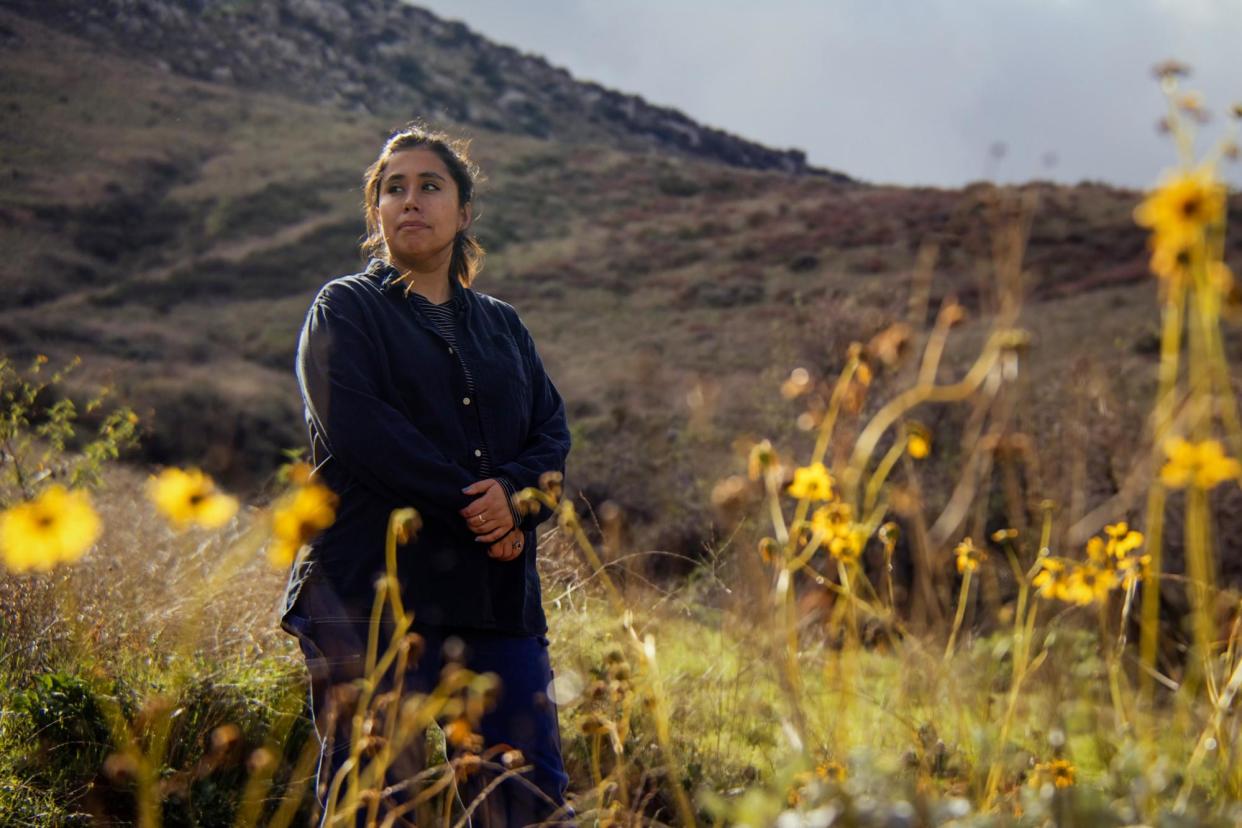Activist wins Goldman prize for effort to clean up California trucking and railway sectors

A grassroots organizer from one of the US’s smoggiest communities has been awarded the prestigious Goldman prize for environmental activists, after leading a successful campaign to clean-up California’s trucking and railway sectors.
Andrea Vidaurre from Inland Empire, a sprawling metropolitan region in southern California, helped persuade state regulators to adopt two historic transport regulations that will improve local air quality for millions of people – and accelerate the country’s transition away from greenhouse gas spewing vehicles.
Related: Revealed: how warehouses took over southern California ‘like a slow death’
Vidaurre, 29, was compelled to act after the once picturesque region, where she was born and raised, was transformed into an inland port and trucking hub connecting the busiest shipping container ports in the country – Long Beach and San Pedro (Los Angeles) – with thousands of sprawling warehouses that operate 24/7. Amazon, which owns many buildings in the area, is currently constructing the world’s largest warehouse – a five-story 4.1m sq ft facility.
“They blame it on consumerism, because we’re shopping online but that’s not the full story. This is very profit-driven, and it’s targeted in communities of color,” said Vidaurre, co-founder of the People’s Collective for Environmental Justice.
The air quality for the Island Empire’s disproportionately Latino population is among the worst in the US, thanks to more than half a million diesel trucks – plus freight trains and planes – passing through every single day. Public health experts have dubbed the area a “diesel death zone” due to elevated cancer, asthma and premature death rates.
The In-Use Locomotive Rule and the California Advanced Clean Fleets Rule, adopted by the California Air Resource Board (Carb) in 2023, include the country’s first emission rule for trains and a path to 100% zero emissions for freight truck sales by 2036. The regulations could play a key role in cleaning up the polluting transportation sector, which is the largest contributor to US greenhouse gas emissions.
The groundbreaking rules were adopted after years of campaigning and policy work by Vidaurre – and a small army of community-based organizers – which included bringing regulators and state lawmakers to Inland Empire for toxic tours, so that officials experienced firsthand the relentless noise and dirty air.
Related: ‘Pollution everywhere’: how one-click shopping is creating Amazon warehouse towns
“It was super impactful that the decision-makers came to the communities to see how close warehouses are to schools, to feel the ground moving from the trains, and see the pile of asthma medications some kids take. We cannot keep making regulations based on the status quo on what the industry lobbyists say is economically viable, we need solutions that address the problems,” said Vidaurre.
Big polluting industries often claim that tighter environmental regulations will cost jobs and damage the economy. Vidaurre, whose family has long worked at warehouses and freight airports – unloading trucks, moving packages, and loading planes – tackled this industry myth head-on by mobilizing trucking and warehouse labor unions and ensuring that the new regulations address workers’ concerns. As a result, the onus for transitioning from diesel to electric trucks will be on companies like Amazon and FedEx whose products are being moved – not the truckers.
“Historically, environmental policies have not always included workers and they have been screwed. It doesn’t have to be like that. We live and work in these communities, and environmental justice is about looking out for both.”
Vidaurre is the 2024 North American winner of the Goldman prize – which honors the leadership of grassroots environmentalists from the world’s six inhabited continental regions. To date, the prize has recognized 226 winners from 95 countries, some of whom have gone on to become heads of state and Nobel Prize laureates.
Related: 2023 Goldman environmental prize winners include Texas Gulf coast defender
This year’s other winners are: Indigenous activists Nonhle Mbuthuma and Sinegugu Zukulu, who halted destructive seismic testing for oil and gas off South Africa’s Eastern Cape; Alok Shukla, who led a campaign in India that saved 445,000 acres of biodiversity-rich forests from coal mining; Teresa Vicente, who led a grassroots campaign to save Europe’s largest saltwater lagoon from collapse; Marcel Gomes, whose international campaign linking beef from the world’s largest meatpacking company to illegal deforestation in Brazil prompted six major supermarket chains to stop stocking JBS products; and Murrawah Maroochy Johnson, whose victory against a proposed coal mine in Queensland set a legal precedent for First Nations people in Australia.
“These seven leaders refused to be complacent amidst adversity, or to be cowed by powerful corporations and governments. Alone, their achievements across the world are impressive. Together, they are a collective force – and a growing global movement – that is breathtaking and full of hope,” said John Goldman, president of the Goldman Environmental Foundation.
The struggle for clean freight is far from over – even in California. The new regulations are facing legal challenges and cannot be implemented until the federal Environmental Protection Agency (EPA) grants a waiver. But Carb, the new rule, is nudging the trucking industry to begin phase-in of the new zero emissions mandates, and eight other states have so far indicated that they will adopt similar trucking rules approved by the EPA.
Vidaurre said: “We need to make a better system for moving goods that will protect our air, communities and the planet from freight. There’s no more time to waste.”


